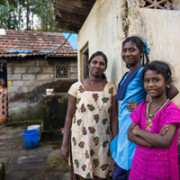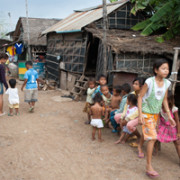Archive | Blog RSS feed for this section
Economics, Energy
 Urban development
Urban development
 Finance sector development, Social development and protection
Finance sector development, Social development and protection
 Social development and protection
Social development and protection
 Finance sector development
Finance sector development
 Social development and protection, Water
Social development and protection, Water
 Economics
Economics
 Health
Health
 Economics
Economics
 Economics
Economics

Do Japan’s oil consuming sectors still react to oil price movements?

Japan is almost fully dependent on energy imports. In March 2011, a devastating earthquake and tsunami hit eastern Japan and damaged the nuclear power plant in Fukushima. This disaster led to the shutdown of all nuclear power plants due to the lack of government safety approvals. Japan replaced this significant loss of nuclear power with energy generated from imported natural gas, low-sulfur crude oil, fuel oil, and coal.
Housing markets and housing policies in India

The cliché “Abandon all hope, ye who enter here” from Dante’s Inferno appears more appropriate to the current housing situation in India than anywhere else. India is facing a daunting housing shortage of 49 million units (Tiwari and Parikh 2012) Going forward, with urbanization and growing economic disparity, the challenges associated with housing availability, provisioning, and use will be further extenuated if appropriate remedial measures through policies and programs are not undertaken.
Bringing financial services to the PRC’s poor will boost poverty reduction

The People’s Republic of China (PRC) has achieved remarkable economic growth, but there are a number of serious imbalances between coastal and inland regions, and between urban and rural areas. The government wants to help bridge this gap by developing inclusive finance tools.
Untold side of Asia’s poverty story and SDGs

On 25–27 September, less than 3 weeks from now, heads of state of 192 nations will sign up for the Sustainable Development Goals (SDGs) which will succeed the Millennium Development Goals (MDGs) as the new global development agenda. Notwithstanding such an important change, poverty eradication will remain the most important goal and Asia is expected to continue its dominant role in attaining this goal for the world.
Mortgage lending and financial stability in Asia

Domestic banking crises often originate in the real estate sector. Therefore, one might conclude that mortgage lending is negative for financial stability. However, in normal (noncrisis) periods, mortgage lending may actually contribute to financial stability. This is because mortgage loans have different risk properties from other bank assets such as commercial loans, so having some share of mortgage loans in a bank’s portfolio tends to diversify the risk of that portfolio. Also, because individual mortgage loans are small, they do not contribute much to systemic risk, except in periods of real estate bubbles (IMF 2006).
Extending the reach of flood insurance

Over the past few weeks, South Asian countries have been suffering torrential rains and devastating floods and landslides, exacerbated by Cyclone Komen, leaving over 100 dead and over a million displaced from Pakistan to Myanmar. The annual monsoon season in the region, normally a lifeline for farmers, this year resulted in floods that have caused severe damage to crops.
PRC’s slowdown for Asia’s growth – key takeaways

After many decades of driving regional growth, the economy of the People’s Republic of China (PRC) is now slowing down, and this is likely going to have a noticeable effect on the world economy and especially globally integrated economies in developing Asia.
Impact of universal health coverage: A micro-founded macroeconomic perspective

Universal health coverage (UHC) has become a key agenda of policy makers in many countries. According to the definition of the World Health Organization (2010), UHC is the goal that “all people have access to health services and do not suffer financial hardship in paying for them.” In most developing countries, the goal of UHC is not easy to reach due to the fact that large, resource-poor populations have limited access to health services. Given that resource-poor people cannot afford out-of-pocket health expenditures, or can only afford them by sacrificing other priorities, a health financing system where people are required to pay for use directly is one of the major barriers to reaching UHC. Although cost sharing is necessary to prevent the overutilization of health services arising from the potential problem of moral hazard, universal coverage is more likely to be reached when the out-of-pocket ratio for direct payment is sufficiently low.
Importance of SMEs in the Thai economy
By Naoyuki Yoshino, Farhad Taghizadeh-Hesary, Phadet Charoensivakorn and Baburam Niraula. Posted July 31, 2015

Small and medium-sized enterprises (SMEs) play a significant role in the Thai economy. In 2012 there were 2.7 million SMEs in Thailand (see Figure 1) comprising 98.5% of total enterprises. In the same year, SMEs accounted for 37.0% of gross domestic product (GDP) and 80.4% of the workforce. Thai SMEs also contributed to 28.8% of total exports and 31.9% of total imports by value in 2012.
East Asian bond markets entering choppy waters

After years of smooth sailing through calm market conditions, bond markets in East Asia are navigating through stormier weather. Data from the supplement to the 2015 Asian Development Outlook released this week shows that weaker growth in the United States and the People’s Republic of China (PRC) has weighed down overall regional growth.


Search
Subscribe / Connect to Asia Pathways
Subjects
- Agriculture and natural resources
- Blog
- Capacity development
- Climate change
- Economics
- Education
- Energy
- Environment
- Finance sector development
- Gender
- Governance and public sector management
- Health
- Industry and trade
- Information and Communications Technology
- Infrastructure
- Miscellaneous
- Population
- Poverty
- Private sector development
- Regional cooperation and integration
- Sanitation
- Social development and protection
- Transport
- Uncategorized
- Urban development
- Video Blog
- Water
Recent Posts
- Artificial intelligence: A new driver for inclusive growth and development?
- Increasing trust in cross-border e-commerce and artificial intelligence
- Enhancing access to maternal and newborn healthcare in developing Asia
- Can electric vehicles lead the way to a sustainable future?
- Mitigating climate-related sovereign risk to accelerate action on the climate emergency




Recent Comments